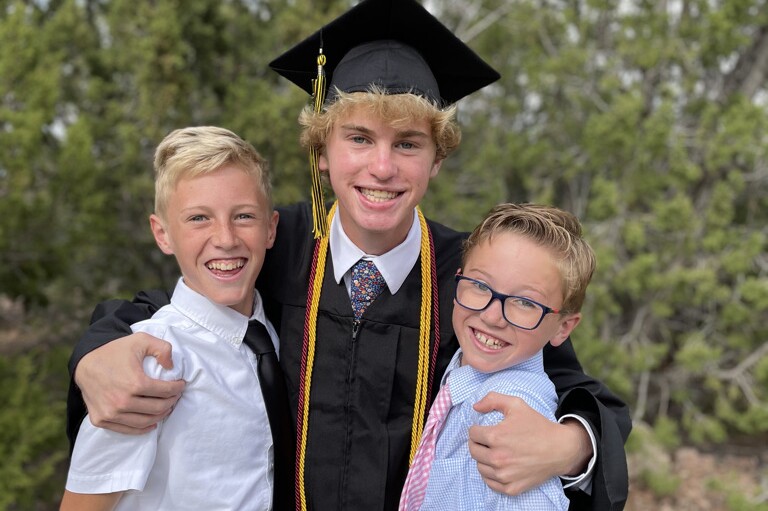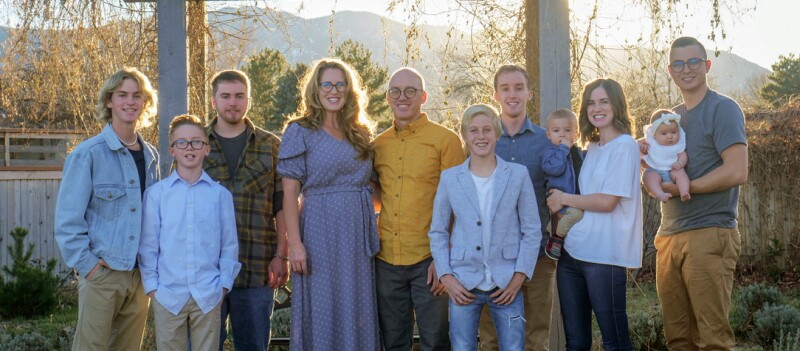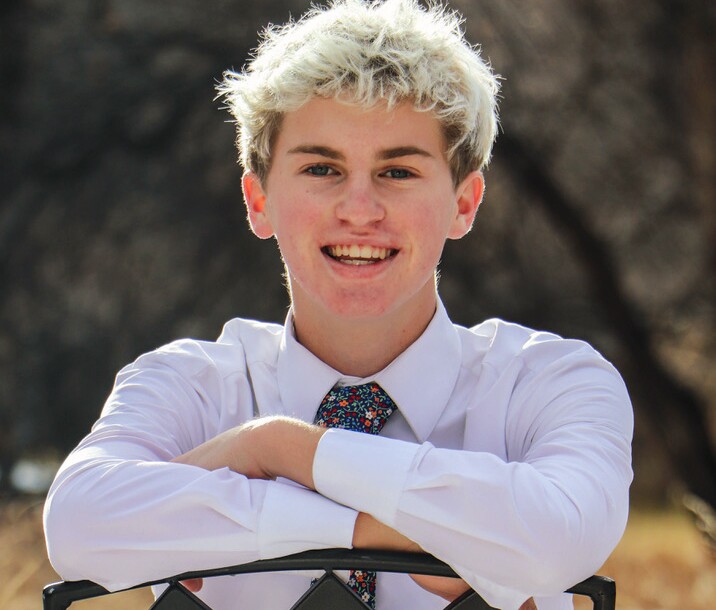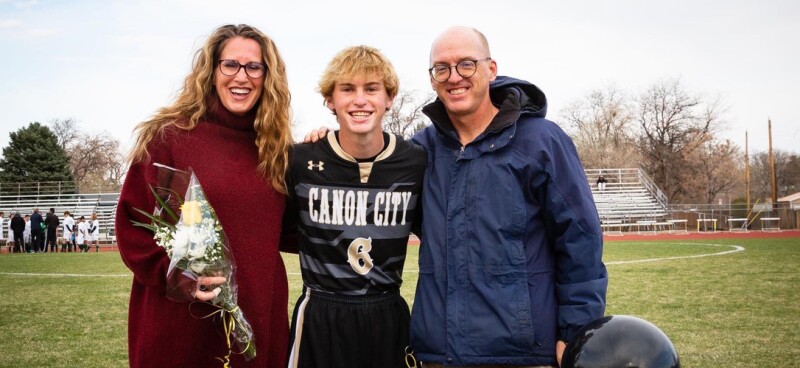I remember feeling so conflicted. I was running a campaign to be elected mayor and was meeting with multiple local leaders to solicit their support. While expanding my bubble of associations, I realized how many of my community peers were openly gay.
At first, I felt twinges of guilt. Was I betraying my membership in the Church by sharing a meal with people who identified as gay? Was I openly condoning inappropriate behavior?
However, as I got to know members of the LGBTQ community on a human-to-human level, I grew to appreciate how much we have in common, and I realized they didn’t fit the prototyped mold I had been taught in my cultural upbringing.
I couldn’t have known at the time, but this softening of my heart was preparing me for when my own teenage son came out as gay just weeks after I was elected mayor.

Our son Kyle opened up to our family about his same-sex attraction when he was sixteen years old. He wasn’t being rebellious or choosing a popular trend. He was being raw and honest. As much as he tried to suppress his gay nature, it just wouldn’t—couldn’t—go away.
My biggest fear when Kyle said the words “I’m gay” was losing him. Losing him from the gospel, from a relationship God, and from our family. More than anything I wanted to make sure he stayed nestled into our family nest.

I wish I could say I handled the news like a pro, but I didn’t. When I told Kyle’s younger brothers, the looks on their scared little faces spoke as if I’d just declared their brother dead from a tragic accident.
This marked the first of many moments where I realized the warped hole we had dug ourselves into, and I felt like putting my hands in the air and imploring, “Can we all just calm down? This isn’t a funeral!”
The unintentional shaming by members of our family and members the Church—both before and after he came out—was driving Kyle to a dangerously dark place. During our process of trying to better understand Kyle, same-sex attraction, and Church teachings, it became readily apparent how inadequately so many of us are understanding and loving our LGBTQ children.
While our family was delicately dancing through the “what do we do now that we have a gay child” phase, there were some in our Church community who were incredibly wonderful, who expressed how Kyle’s news didn’t change anything for them. Most people awkwardly avoided the topic, preferring it to be kept in the closet.
And then there were those who sincerely thought they were being helpful, but their misguided reactions and comments caused so much harm.
One friend said, “I feel I should bear my testimony to you that the proclamation on the family is true.” I felt like saying, “I still believe the proclamation on the family is true, too!” Others offered herbal remedies or phone numbers for cognitive therapy.
On the more extreme side, we were handed decades-old books about the satanic abomination of homosexuality that were bookmarked and highlighted. A doorbell ditch left unsolicited piles of literature on overcoming pornography and masturbation addiction on our porch. We were asked how “deep” we were in the LGBTQ movement because our longtime friends were no longer sure if our children should play together.
Considering how far the Church has come in trying to better understand and accept members who experience same-sex attraction or identify as gay, lesbian, or bisexual, these insensitive and uninformed reactions were both hurtful and alienating. Even more so has been the pain of our young people, who are trying to figure out how and if they have a place in our religion.
Too many are not safely landing within the walls of our homes, places of worship, and communities at large.
My hope for Kyle and other vulnerable members is that we can better accept and unconditionally love them rather than push them out as they are grappling with complicated feelings and difficulties.
On the Church’s “Same-Sex Attraction” website, Carol F. McConkie says in a video called “Lifting Others”: “We just cannot be—or even call ourselves—a disciple of Christ if we are not helping others along that path. The gospel of Jesus Christ does not marginalize people. People marginalize people. And we have to fix that.”

During my family’s experience, it became very poignant how Church members tend to use common phrases that, while used with the best of intentions, can marginalize and engender resentment and exclusion rather than be helpful to someone who has come out as LGBTQ.
Kyle certainly understands the importance of the words we use. “There are so many young people in this world hiding such an amazing and beautiful part of themselves,” he says. “Remember that your words are so important to the people that look up to you, so choose them carefully. Choose love.”
Here are some things that members can say or do as they interact with LGBTQ loved ones:
“Can you share your story with me?”
Instead of saying, “You can get through this”—which can feel like saying “There’s something wrong with you that needs to be overcome, and in order to fit in as a Latter-day Saint you need to get rid of it”—consider simply asking, “Can you share your story with me?” Being gay, in itself, is not something to “get through.”
The Church’s website answers the question “If I’m faithful enough, will my same-sex attraction go away?” The response says, “The intensity of same-sex attraction is not a measure of your faithfulness. Many people pray for years and do all they can to be obedient in an effort to reduce same-sex attraction, yet find they are still attracted to the same sex. … A change in attraction should not be expected or demanded as an outcome by parents or leaders.”
As we try to better understand same-sex attraction, it’s important to find empathy for what people who identify as LGBTQ are experiencing and compassionately ask questions like “What does this feel like for you?” and “What do you wish people knew about your identity?” with an open mind rather than trying to “love” them into changing who they are.
“You’re an amazing person.”
When we say things like “As long as you don’t act on it, it’s not a sin,” we hyper-focus on sexual behavior and not on the whole complex human. Too often, the word gay is myopically associated only with erotic or romantic behavior. LGBTQ people are just like anyone else: they desire to live compassionate lives and have a positive impact on the world. And all are blessed with myriads of wonderful attributes—independent of being gay—that make them a uniquely amazing human. Sexual orientation is just one part of their identity.
My son Kyle, for example, is about a million things. Some great. Some not so great. His athleticism earned him a starting spot on the varsity soccer team as a freshman in high school; his show choir team won the state championships; he was elected student council head boy; he helped start a kindness campaign; he graduated with a 4.0 GPA; and his photography has been featured by well-known social media pages. All around he’s a pretty awesome kid … who just so happens to also be gay.
“This must be very difficult.”
When speaking to LGBTQ members, it’s helpful to validate them by acknowledging how difficult their experiences have likely been. It’s also helpful to acknowledge that their experiences are very different from other members’. For example, saying “We all have weaknesses to overcome” is a very true statement for each and every one of us. However, it is probably not a helpful or true statement to apply to a person’s sexual orientation. Unless you have a “weaknesses” that is said to have caused the destruction of entire cities with fire and brimstone or has impacted your employment and housing opportunities, you may not be able to fully understand what an LGBTQ person is experiencing.
Instead, offer validation for the unique feelings and experiences the LGBTQ member is going through. When Kyle and I were both interviewed for a university study on microaggressions within the Church, it was the first time in two years I was able to honestly talk about our experiences after Kyle came out as gay. One simple statement from the interviewer was surprisingly overwhelming: “That must’ve been really difficult.” Years of anxiety, hurt, and betrayal were taken off our shoulders. That simple statement from a total stranger finally kickstarted us onto a path of healing.
What else can you say? That’s easy!
“You’re safe with me.”
I’ll never forget the first Sunday Kyle came to church after coming out. He was not excited. Not at all. We were all on edge. However, as soon as sacrament meeting was over, his Sunday School teacher came right up and gave him the biggest hug. That gesture spoke volumes.
In continuing to be a loving friend, we are not betraying our religion, nor are we signing up to march in the next LGBTQ parade. We are simply saying, “I care about you, and you are safe around me.”
Elder Quentin L. Cook has said: “As a church, nobody should be more loving and compassionate. Let us be at the forefront in terms of expressing love, compassion, and outreach. Let’s not have families exclude or be disrespectful of those who choose a different lifestyle as a result of their feelings about their own gender.”
“I’m sorry for being hurtful.”
As we dealt with Kyle’s coming out, our family said a lot of misguided things over the years that we wish we could take back. An apology to Kyle was in order to start the healing process and mend our relationship. It can be difficult and require humility, but an apology can make a huge difference to start rebuilding trust and understanding.
For us, it wasn’t just a one-and-done “I’m sorry,” but a process of open conversations, seeking professional counseling, and simply trying to do better. Luckily the effort, even though it was messy and stressful at times, counted in Kyle’s book.
As the Church’s website states, “As Church members, we all have a responsibility to create a supportive and loving environment for all our brothers and sisters. Such a support network makes it much easier to live the gospel and to seek the Spirit while navigating any aspect of mortality.”
“Can you have patience with me?”
It probably took the LGBTQ member a long time to come to terms with their sexual orientation, and it will probably take time for you to fully understand what they’re going through. You will likely make some mistakes along the way, and that’s OK. You can each acknowledge this reality from both sides. “We all need to be patient with each other as we figure things out,” the Church’s website says.
“You can live a wonderful life full of joy and fulfillment.”
How I wish Kyle had known this from the beginning of his grappling. In our very first conversation as Kyle came out, he cried, “Does this mean I’m going to have a life filled with misery and grief?” This bitter statement haunts me.
I was heartbroken to learn that at times Kyle was unable to even just park outside a church building with neutral intentions to play basketball without being triggered with trauma. How much different would Kyle’s overall sense of peace be if our prior years of LGBTQ conversations had focused on LGBTQ people’s ability to both be gay and have a happy and healthy life—even within the Church, if they choose that path and are able to do so.
Elder Whitney L. Clayton expounds, “I now speak directly to Church members who experience same-sex attraction or identify as gay, lesbian, or bisexual. … We want you to be part of our congregations. You have great talents and abilities to offer God’s kingdom on earth, and we recognize the many valuable contributions you make. If any of you are unclear about where the Church stands on these issues, we invite you to please take the time to view the material published at ChurchofJesusChrist.org/topics/gay.”

There are still a lot of things I don’t know or understand about same-sex attraction and its relation to the doctrine of The Church of Jesus Christ of Latter-day Saints. What I do know is that I can have faith that God’s plan is perfect and I can trust in Jesus Christ.
I never would have believed it, but I am seriously grateful that He has blessed me with a gay child. It has changed me for the better by compelling me to come face-to-face with my shortcomings and begin to feel firsthand what marginalized groups feel like.
As we welcome opportunities to humbly probe into this complicated subject, we can begin to see the real people behind the LGBTQ label and discover our common humanity. We can find ways to authentically act with kindness and inclusion, honestly love one another, and realize that what we say matters. A lot.










